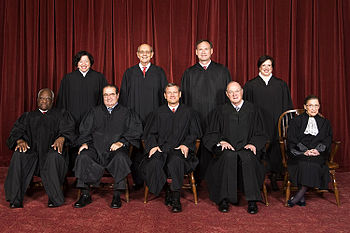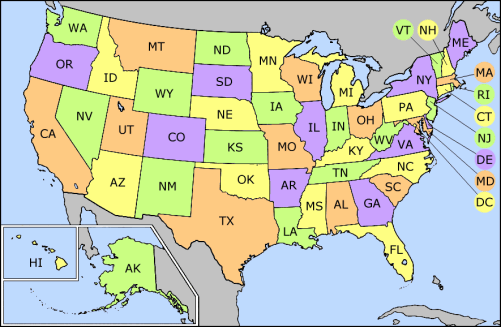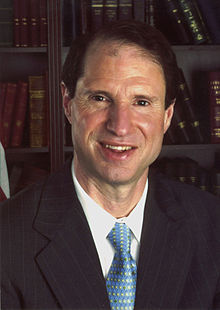In Part One, I'll cover the dangers of taxing consumption as a major source of government revenue, both to the individual and to the economy.
Part Two will cover the little-known problems in the FairTax proposal- the "fine print" FairTax advocates won't tell you about (or don't know themselves); I'll also refute some of the inconsistencies and rhetoric used by FairTax advocates.
Part Three will introduce the reader to the benefits of flat income taxation- why it's superior to consumption tax, and the economic benefits of flattening the tax code.
Part Four will introduce the reader to the Negative Income Tax Credit- an ideal solution to the the problems of our massive welfare state, which can only be implemented in conjunction with an income tax system.
Part Two: What You Don't Know About FairTax
In the last segment, I illustrated the problems inherent in consumption taxes generally; in this part, I'll address the issues with Fair Tax specifically.
First: FairTax is a hidden tax. In order to avoid the offensiveness of instituting a high sales tax, a part-and-parcel component of the FairTax legislation is to make it an "inclusive" tax, one which is built into the sticker price of goods and services, as opposed to the "exclusive" sales taxes we are already familiar with, where the tax is added on when we get to the cash register.
Inclusiveness conceals the real rate of taxation. To illustrate this, I'll use a simple example:
FairTax, as proposed, would be levied at an "inclusive" rate of 23%. This means 23% of the sale price is remitted to the government by the seller. If the seller wants to sell an item and make $1.00 from the sale, he must sell the item for $1.30, because 30 cents is 23% of $1.30.
In other words, a 23% "inclusive" rate is actually a tax rate of 30%.
This disparity between actual rate and inclusive rate grows as the tax grows: At a 33% "inclusive" rate, the actual rate would be 50% (33% of $1.50= 50 cents).
Consider this point: FairTax advocates propose FairTax as a replacement for federal income tax (up to 35%), FICA (15.3%, for both "halves"), and several other taxes. Considering this, does it seem unreasonable to believe that these taxes would be replaced by a "33%", rather than a "23%", tax?
In fact, the "23%" rate is only guaranteed in the FairTax legislation for two years- after which, a formula is used to calculate a new, higher rate, defined in the FairTax bill (see link at bottom) as "the general revenue rate, old-age, survivors, and disability insurance rate, and the hospital insurance rate".
Second, unlike current sales taxes, FairTax is not just a tax on goods. FairTax, if instituted, would apply to services as well. Stated another way, this means a 30% markup your phone bill, your car insurance bill, your cable bill, your garbage removal bill, etc.; a 30% markup on your grocery, fuel, medication, and clothing purchases; a 30% markup on the purchase of a home or a car. If your washing machine or central air conditioning breaks down, the cost of parts and the bill for labor from the appliance repair service will include a 30% markup. This "30% markup", of course, assumes a FairTax rate of 23% (see above).
FairTax advocates frequently argue that this markup wouldn't occur, because other taxes embedded in products would be eliminated, so the price of goods would remain about the same. Hank Adler makes an excellent case to defeat this assumption, in reference to the sales tax component of Herman Cain's 9-9-9 plan:
One need only look to the annual report of Safeway to understand the impact of 999 on grocery prices. Because the grocery business is incredibly efficient and there is significant competition, there are very, very low margins in the industry. The pretax profit in good years for Safeway is only about 2% of sales and the Federal income taxes therefore are less than 1/2% of sales. After making a reasonable guess based on other information in the Safeway annual report, the total Federal income tax plus Safeway’s portion of their employees’ payroll taxes is less than 2% of sales. Assuming that would all be passed through to the customer in the way of price reductions, the price of food must increase by about 7%.This is, of course, in reference to the effect of a 9% tax. Consider this effect with a 30% tax!
Third: FairTax doesn't eliminate payroll taxes. It doubles them. Another inclusion stated in the FairTax legislation (see link at bottom), is the requirement that businesses pay the 30% markup on wages and salaries if the employee's services constitute a "taxable service", defined as:
A taxable service is used to produce, provide, render, or sell a taxable property or service if such property or service is purchased by a person engaged in a trade or business for the purpose of employing or using such taxable property or service in the production, provision, rendering, or sale of other taxable property or services in the ordinary course of that trade or business.This definition is extended to also include "research, experimentation, testing, and development".
Translation: Since virtually every employee (other than a personal employee such as a maid or chauffeur) meets this definition, every employer will be required to pay a 30% tax on wages and salaries.
If this doesn't make you, the reader, jump away from FairTax right now, I don't know what will.
Fourth, this 30% markup on everything extends to purchases by state and local governments. Yes, you read that correctly: State and local governments will have to pay taxes to the federal government. This means two things to you: 1) Your state and local taxes will go up; 2) State and local governments will be in continuous debt to the federal government.
This brings us to the Fifth point: The claim made by FairTax advocates that FairTax would eliminate the Internal Revenue Service. This is false. As you can see in the FairTax bill (see link at bottom), the IRS would merely be renamed as two new agencies: The "Excise Tax Bureau" and the "Sales Tax Bureau" of the Department of Treasury. Some personnel would be transferred to the Social Security Administration to administer the prebate program (see "Eighth", below).
However, the responsibility of collecting the tax would be transferred to state tax departments. In other words, not only would state and local government be constantly indebted to the federal government, but would also be required to perform work for the federal government.
This bizarre arrangement has another implication: It paves the way for further federal intrusion into state affairs. Instead of Congress debating over ways to fund new mandates on the states, Congress will simply be able to place mandates on the states in exchange for a tax credit. Cash-strapped states (i.e. every state, currently) will accept these opportunities to lower their tax burden to the federal government.
Stated differently: You can kiss the Tenth Amendment goodbye.
Sixth: On the subject of Constitutional amendments, we encounter another problem with FairTax: The Sixteenth Amendment, which authorized the federal income tax. Adding a constitutional amendment is extremely difficult; it's even more difficult to repeal one. In the case of FairTax, in order to be constitutional, both would have to happen: The Sixteenth Amendment would have to be repealed, in order to prevent Congress from taxing both incomes and sales (and you and I both know Congress would do that if given a chance), and to authorize a federal sales tax. FairTax advocates believe the Constitution already permits a national sales tax. I disagree. The Constitution authorizes taxes which are limited in scope- excise taxes, which are currently applied to a specific category of goods- but does not authorize a universal tax on the sale of all goods and services. We already have enough problems with Congress assuming powers not expressly granted in the Constitution, without handing them another one.
Seventh: On the subject of federal power grabs, let's consider an implication of any (and every) sales tax. Governments use sales taxes to manipulate purchasing habits by exempting certain products from taxation. The states are limited in their ability to do this, however, since a price difference of 5-8% generally isn't enough incentive to change the buyer's mind about a purchase. The federal government's ability to manipulate purchasing habits is also currently limited to income tax credits, which can be claimed at the end of the year to partially offset the cost of a major purchase such as a hybrid car or a new home, months after the purchase is made. The ability to immediately alter the shelf price of items by 30% or more would give the federal government an unprecedented ability to centrally plan and manipulate the economy.
Eighth and last is the "Prebate". As shown in Part One, consumption taxes are highly regressive. In an attempt to offset this regressiveness, the FairTax proposal includes a "prebate", a check issued to every household in the United States, every month, to offset the amount of sales tax paid up to the poverty line.
This, of course, presents two significant issues:
1) Any argument that FairTax would reduce federal bureaucracy is patently absurd, given that this proposal means the federal government would now have to issue more than a billion 'prebate' checks every year;
2) The next time our government experiences a budget crisis (as we're experiencing now), there will no doubt be an effort to "means-test" the prebate- just as there are now proposals to means-test Social Security and Medicare. A "means-tested" prebate would amount to yet another welfare grant. Instead of working to reduce the cost and scope of the welfare system, this would only add to it.
In sum: In addition to all the problems with consumption taxes generally, FairTax would give us a stealth tax, embedded in the cost of goods and services, which uses 'fuzzy math' to conceal the true rate of taxation; FairTax would present insurmountable Constitutional issues; it would give the federal government unprecedent power to manipulate both the economy and state governments; and would pave the way for a costly new welfare benefit.
Folks, don't be hoodwinked by slick FairTax salesmen. Don't make the mistake of assuming (as many FairTaxers do) that anyone opposed to FairTax is a "closet liberal", or "opposed to change". And don't blindly accept any change just for change's sake.
You can read the full text of the FairTax bill presented to Congress (the most recent version) here.














